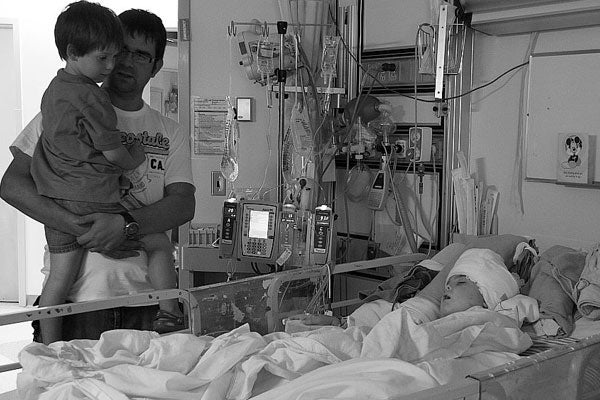
New program aims to improve care for children with life-threatening illnesses
Published: April 17, 2014
Researchers at the University of Toronto and The Hospital for Sick Children (SickKids) hope to improve palliative and end-of-life care for children all across Canada, with a new program backed by the Canadian Partnership Against Cancer (CPAC).
“Palliative care is not just about caring for children who are going to die from their disease, but also about providing excellent care and support to families right from the time a child is diagnosed with any type of life-threatening illness whether they go on the survive that illness or not,” said Kimberley Widger, co-lead of the initiative, assistant professor in the Lawrence S. Bloomberg Faculty of Nursing at University of Toronto, and nursing research associate with the paediatric advanced care team (PACT) at SickKids.
“The threat of death is always there and the various treatments we give to these children to try and cure them are often painful and intense.They should not have to wait until they are dying to benefit from all the good things that palliative care has to offer.”
The program, known as Education in Palliative and End-of-Life Care for Pediatrics (EPEC®-Pediatrics) is funded by a grant from CPAC, part of that organization’s larger $13 million nation-wide initiative. Specifically designed for paediatric oncology physicians and advanced practice nurses, the EPEC program will ensure regional teams from each of the 16 paediatric oncology programs across Canada receive comprehensive education about evidence-based palliative care while also acquiring the tools to teach others.
“When I talk to parents about their experiences with health care professionals during the time their child was dying, I hear both ‘good’ and ‘bad’ stories,” Widger said. “When I hear the great things that many health professionals do to support these families, I am so proud of our professions and I share these examples in my teaching.
“When I hear the examples of things that health professionals did or said (or did not do or say) that added to the burden carried by the family, I am motivated to keep working hard to make things better for the next family.”
Widger, who moved into research after years of clinical practice, said families need to receive care from health professionals who understand and apply the principles of palliative care to improve quality of life and address fears not only for the child, but for the whole family.
“It was often little things I did that could make a difference for families,” Widger said. “I could never take away the family’s pain of watching their child die, but I could make sure that I did not do anything to make that pain worse and I could ‘simply’ be there in the midst of that pain so they were not alone.”
Even with improvements in treatment, childhood cancer remains a leading cause of non-accidental death in children. Of the approximately 10,000 children living with cancer in Canada, more than 200 will die from the disease this year. Palliative care for children focuses on alleviating the physical, social, psychosocial and spiritual suffering experienced by children, while also promoting quality of life, fostering family connections and sustaining hope, Widger said.
“If we can regularly measure how well health professionals are meeting the needs of these families then we can identify what is being done well and what areas need more work,” Widger said. “Now I can use the instrument I developed during my PhD to continue assessing the quality of end-of-life care to see if any changes we make in the care provided actually makes a difference for families.”
Upon completion of the curriculum, regional teams will become EPEC®-Pediatrics Trainers, with the knowledge and tools to disseminate all aspects of the curriculum to other healthcare providers. Trainers will be supported by the project team to implement new knowledge and skills and lead quality improvement projects in their local communities with a goal of improving the quality of palliative and end-of-life care for children with cancer.
“Children with cancer see a variety of health care professionals in hospital, in the community and at home. By enhancing knowledge about paediatric palliative care across the board, we feel that this education initiative provides a real opportunity to make a difference in the lives of children and families who are dealing with cancer,” said Dr. Adam Rapoport, co-lead of the initiative and Medical Director of PACT at SickKids.
Dave Ross is a writer with the Lawrence S. Bloomberg Faculty of Nursing at University of Toronto.



